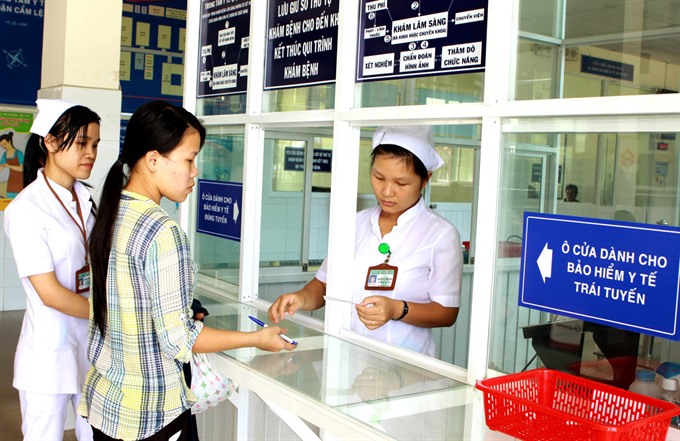 Society
Society

The health insurance medical information system, rolled out last June, is the optimal solution to ensure transparency and prevent insurance fraud. This consensus of opinion was evident among Government officials at a conference by the Việt Nam Social Security agency on Monday to announce its review on yjr implementation of the health insurance medical information assessment system.
 |
| Infrastructure and information technology are provided at Cẩm Lệ General Hospital in central Đà Nẵng city. Computerised management of healthcare information is a necessity that will increase healthcare efficiency, achieve transparency and prevent fraud in a country with 90-million population, and about 23,000 drugs and 16,000 medical services covered by health insurance.- VNA/VNS Photo oto |
HÀ NỘI — The health insurance medical information system, rolled out last June, is the optimal solution to ensure transparency and prevent insurance fraud. This consensus of opinion was evident among Government officials at a conference by the Việt Nam Social Security agency on Monday to announce its review on implementation of the health insurance medical information assessment system.
According to reports delivered by Phạm Lương Sơn, Deputy Director General of the VSS, 99.5 per cent of medical facilities nationwide have been linked to the health insurance medical information assessment system since its launch, except for 65 commune-level health stations in remote areas without electricity access.
The health insurance medical information assessment system received some 68.9 million dossiers requesting insurance payments worth VNĐ35 trillion (US$1.55 billion) in the last six months of 2016, and another three million requesting insurance payments of VNĐ2 trillion ($88.6 million) in the first month of 2017, the report said.
The information system can identify the use of a health insurance card multiple times in a short period at different locations, both inside and outside a province. In the final quarter of last year, about 100 cases of wrongfull card use over 50 times were discovered – mostly at district-level hospitals and commune-level health stations.
However, multiple plaguing issues still inhibit the effectiveness of the system, Sơn said. For example, many medical facilities still don’t fully update information in the system on a regular basis, and the names of services and drugs are not consistent across related legal documents.
Nguyễn Đức Chung, Chairman of the Hà Nội People’s Committee, said all the city’s 673 medical facilities had connected to the information system. A number of duplications and possible fraud had been exposed as a result, he added.
Chung also proposed the idea of piloting electronic health records of all of the city’s residents.
Push for efficiency
Deputy PM Đam said "computerised management of healthcare information is a necessity that will increase healthcare efficiency, achieve transparency and prevent fraud” in a country with 90-million population, and about 23,000 drugs and 16,000 medical services covered by health insurance.
“The use of modern technology will initially be difficult for many people since they are not familiar with it. Those who have taken advantage of the lack of transparency to profit from the patients will be even more resistant to the idea,” he said.
“Hospitals and localities which are found to deliberately delay or failed to properly deploy the implementation of information system will be suspected of corruption,” Đam added.
According to the Deputy PM, private insurance companies have always wanted to co-operate with VSS to develop insurance services, and assist each other in areas such as approaching customers, sharing information and preventing insurance profiteering.
Deputy Prime Minister said that only four out of 10 insurance holders went to local-level clinics for examination. Many others don’t even go for health checkups until they get sick so they don’t see the benefits of buying healthcare insurance.
At least once per year, he said, a round of "intensive medical examination" for the population must be performed.
With full awareness of the amount of efforts involved in compiling the records of 90 million people, the Deputy PM insisted that it must be done.
Trương Thị Mai, Politburo member and head of the Party Central Committee’s Commission for Mass Mobilisation, reiterated that social and health insurance is an important pillar of social security. Universal health insurance is the answer to ensuring health services for all people without constraining the already limited budget.
“But, people’s money must be cherished and used efficiently to prevent losses,” Mai said, “any loss is a crime against the people.”
Implementing linkages
The Government Office yesterday conveyed to relevant Government ministries the orders of Deputy Prime Minister Vũ Đức Đam on implementing linkages between Government-sponsored health and social insurance programmes private insurance plans, in a bid to expand universal healthcare coverage to all the people.
The Ministry of Finance and Việt Nam Social Security (VSS) are tasked with conceiving a plan for co-operative mechanisms to build a database that stores the information of those holding health insurance and social insurance and can be shared with private insurance companies.
The Ministry of Health and the Ministry of Labour, Invalids, and Social Affairs, in collaboration with VSS, have ordered reports on the health insurance and social insurance systems, respectively. Also included in the reports will be measures that other countries have implemented in linking government-sponsored insurance programmes with their private counterparts, as well as their experiences and measures suitable for implementation in Việt Nam.
The ministries are ordered to report to the Prime Minister in February.—VNS




